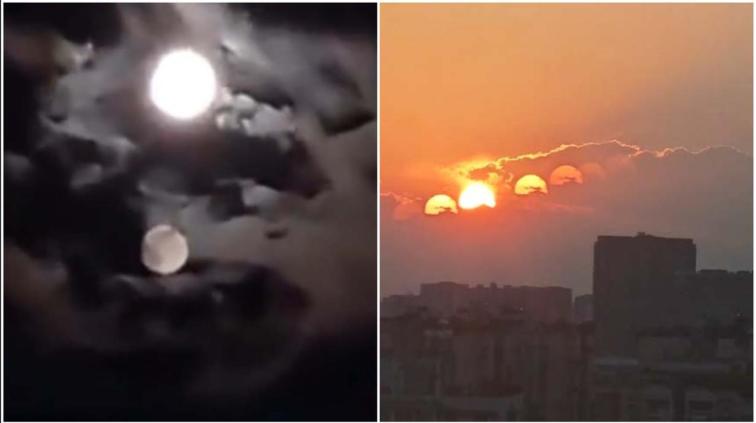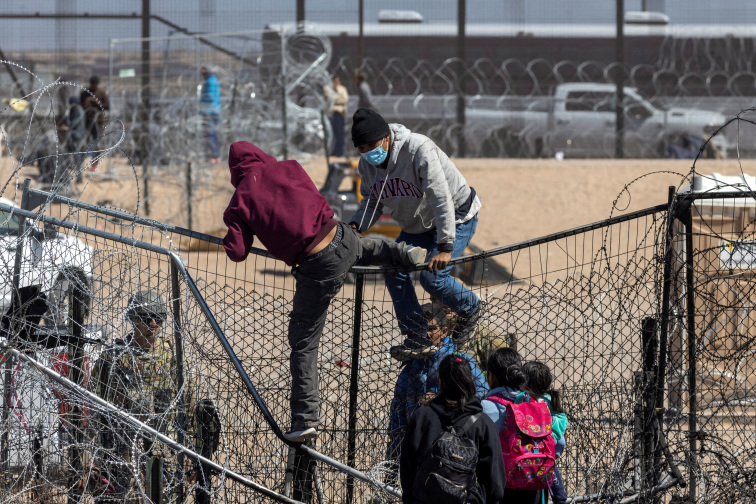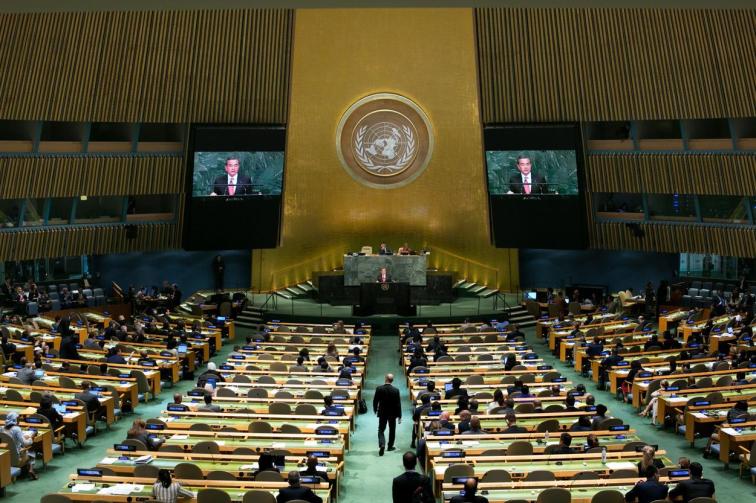On December 4, 2024, Chinese Communist Party (CCP) leader Xi Jinping, accompanied by members of the Central Military Commission (CMC), visited the headquarters of the newly established Information Support Force in Beijing. During the visit, Xi met with representatives of the Party Congress of the Information Support Force, extending "warm congratulations." However, most faces in the group appeared devoid of smiles. Zhang Youxia, standing behind Xi, was seen staring intently at the individuals shaking hands with Xi, his expression stern. (Video screenshot)
[People News] On December 4, CCP leader Xi Jinping inspected the newly established Information Support Force. All CMC members, except for Miao Hua, were present to accompany him. This seems to be a deliberate effort to dispel rumors and demonstrate that the upper echelons of the Chinese military remain stable. However, the so-called inspection was limited to group photos at the force's headquarters and listening to briefings. In his speech, Xi once again refrained from mentioning the "Chairman Responsibility System of the CMC" and instead made ambiguous references to "leadership principles" concerning military authority. He also avoided mentioning "political rectification" or "political military building." The tense expressions on the attendees' faces suggest that the visit was more of a show than a substantive effort to quash rumors.
A "Warm Congratulations" Without Smiles
On December 5, Xinhua reported that Xi Jinping inspected the Information Support Force headquarters in Beijing on December 4, on behalf of the "Central Committee" and the "Central Military Commission" (CMC), to extend "warm congratulations" on the first Party Congress of the Information Support Force. This appeared to be the nominal purpose of the inspection, but the attendance of high-ranking CMC members Zhang Youxia, He Weidong, Liu Zhenli, and Zhang Shengmin was notably excessive and unnecessary. It seems the top brass of the CMC needed to appear together to dispel rumors. However, when meeting with representatives of the Party Congress, there was no visible joy on anyone’s face, and the atmosphere showed no sign of "warm congratulations."
A video released by the Ministry of Defense, which was several seconds shorter than the one aired by CCTV, showed Xi Jinping shaking hands with officers, posing for photos, listening to briefings, and delivering a speech. Throughout, Xi did not smile and at times appeared in low spirits, even seemingly unhappy. Among the CMC members, only He Weidong attempted a slight smile during the group photo, while the others maintained solemn expressions. As for the officers and soldiers present for the photo session, while applause was given, only a few managed to muster smiles. Many seemed unsure whether to smile or not, or were unable to do so naturally. Zhang Youxia appeared to be watching the individuals shaking hands with Xi with a scrutinizing gaze. Most expressions conveyed curiosity or confusion rather than joy.
Within the military, it is well-known that CMC member and Political Department Director Miao Hua has been suspended for investigation, and rumors of infighting at the top levels of the CMC have likely spread widely. Clear directives seem to have been issued to clarify who must be obeyed—or disobeyed—at this time. Under these circumstances, seeing Xi Jinping leading the inspection and still positioned ahead of Zhang Youxia likely made it evident to those present that this was a performance intended to quash rumors.
However, many likely remained curious, wanting to observe how the CCP leader and CMC members would make their appearance and "act." At the same time, they may have been uncertain about how they themselves should behave in this staged performance. This unusual mix of curiosity and hesitation was reflected on their faces. For most, seeing so many top CMC members together is a rare occurrence, but their expressions of cautious inquiry and unease dominated, rather than the typical sycophantic "enthusiastic applause," even though they had likely been instructed to behave in that manner.
In conclusion, this hastily arranged inspection can be seen as an impromptu political performance. Yet, both the main actors and supporting cast seemed unwilling—or unable—to fully cooperate, failing to even project a façade of harmony.
Inspection Limited to Headquarters, Not Bases
Xi Jinping’s recent inspection took place at the headquarters of the Information Support Force, likely in Beijing’s Haidian District, close to Zhongnanhai. This proximity suggests it was a conveniently staged event. While the Information Support Force has bases distributed across China, there is believed to be a communications base in Xinzhuang Village, Changxindian Town, Fengtai District, Beijing.
Had this been a genuine inspection, Xi and the top brass of the Central Military Commission (CMC) would have at least visited the nearest base. Instead, they confined themselves to the headquarters, likely to ensure the event was tightly controlled and focused on appearances. Avoiding interactions with grassroots officers and soldiers may have been deliberate, aiming to minimize the risk of leaks or further fueling rumors.
After Miao Hua’s downfall was announced, the internal turmoil within the Chinese military drew global attention, further exacerbating anxiety within its ranks. Officers who were promoted under Miao’s tenure are likely on edge, fearing a knock on their doors from the military's Discipline Inspection Commission. Meanwhile, Beijing’s political landscape has grown increasingly murky, with widespread speculation that Xi Jinping has effectively lost control of the military. Rumors of his stepping down as the CCP leader continue to circulate. In this context, the CCP leadership urgently needed a political performance to dispel these rumors, but it appears to have fallen short of achieving its goal.
On November 4, Xi inspected the Airborne Troops in Xiaogan, where he reviewed combat and support equipment, was briefed on the technical and tactical features of key weaponry, and expressed his reported "great pleasure." He then toured the Airborne Troops' military history museum and concluded with a group photo, briefing, and speech at the headquarters.
On October 17, Xi visited a Rocket Force brigade in Anhui. He first reviewed the brigade’s military history exhibits, assessed the new-generation weaponry, and observed operational training. Once again, Xinhua reported that Xi was "very pleased." The visit ended with a briefing and a speech after interacting with grassroots officers and soldiers.
Compared to his previous two military inspections, Xi Jinping’s December 4 visit did not involve contact with grassroots soldiers, nor did it include reviewing equipment or observing training. Moreover, Xi appeared visibly "unhappy." The presence of senior CMC officials, under the pretext of attending the first Party Congress of the Information Support Force, seemed to be merely a staged collective appearance. This inspection can only be described as a superficial display. Furthermore, the content of Xi’s speech appears to have been restricted once again.
Ambiguity in Military "Leadership Principles"
In his speech, Xi Jinping began with boilerplate rhetoric about combat readiness but avoided mentioning terms like "political rectification" or "building the military politically." While he did touch on "resolving ideological root problems and deepening ideological rectification," it appeared focused on ideological adjustment rather than widespread purges.
Xi reiterated "adherence to the fundamental principle and system of the Party’s absolute leadership over the military," which relates to control of military power, but he once again refrained from mentioning the "Chairman Responsibility System of the CMC." This omission has further muddied the waters around the CCP military's "leadership principles and systems." It remains unclear whether the CMC Chairman (Xi) holds ultimate decision-making power, whether decisions are made collectively by CMC members, or whether certain CMC members actually wield control over the armed forces.
The exact meaning and manifestation of the "Party’s absolute leadership over the military" might only be understood by those within the military’s inner circles.
While Xi’s speech continued to emphasize ensuring the military’s "absolute loyalty," it notably avoided specifying loyalty to Xi himself or even to the "Central Committee." This raises the question: who, exactly, is the military supposed to be loyal to?
On November 28, the Ministry of Defense announced that "after deliberation by the Central Committee," a decision was made to suspend Miao Hua for investigation. However, it remains unclear which "Central Committee" made this decision. The current Central Committee does not appear to hold actual authority over the military. Miao Hua’s suspension likely did not align with Xi Jinping’s intentions, nor do the Politburo Standing Committee or its members seem to have had much say in the matter.
The repeated absence of references to the "Chairman Responsibility System" suggests that Xi Jinping’s role as CMC Chairman is now largely nominal. He appears unable to issue direct orders to the military. His inspections of military units, the officers he meets, and even the speeches he delivers all seem to be tightly controlled and potentially dictated by other senior military officials.
The CCP military’s new "leadership principles and systems" remain opaque to outside observers, and even grassroots soldiers may be confused. The mention in Xi's speech of "maintaining proper order and security within the forces" seems to be a deliberate message from both Zhongnanhai and the military leadership aimed at projecting stability.
On December 5, embattled Chinese Defense Minister Dong Jun also made a public appearance in Shanghai, meeting collectively with participants of a Gulf of Guinea security seminar, including Nigerian Navy Chief of Staff and Gabonese Navy Chief of Staff Bekale. This was likely another "denial performance," but it does not necessarily mean Dong Jun is free from trouble.
The CCP’s official media has not reported on a Politburo meeting at the end of November, leading to speculation that the November and December meetings might have been combined. The lack of a timely Politburo meeting to discuss or announce Miao Hua’s suspension raises questions about how the "Central Committee" reached its decision. This process remains a mystery.
It is also possible that deep divisions within the Politburo prevent meaningful discussions from taking place. The inability to convene and address key issues reflects the dysfunction at the top of the CCP. To conceal this internal chaos and present an illusion of unity, Xi Jinping and the CMC members had to quickly stage a joint public appearance. Such hastily organized performances aimed at quashing rumors and projecting unity are likely to become a recurring tactic as the year-end approaches. However, whether the infighting CCP officials will cooperate and whether they can find suitable "extras" to support these performances remains uncertain.
(Dajiyuan)











News magazine bootstrap themes!
I like this themes, fast loading and look profesional
Thank you Carlos!
You're welcome!
Please support me with give positive rating!
Yes Sure!